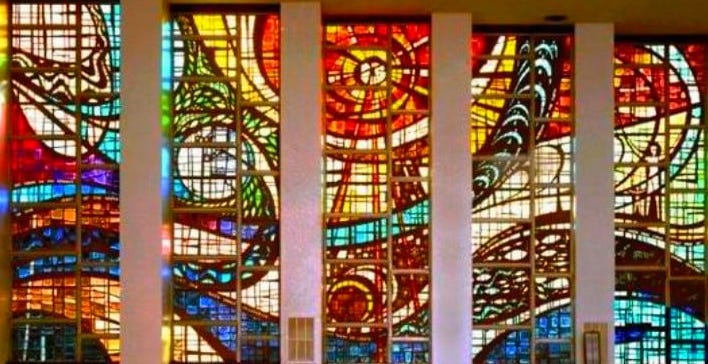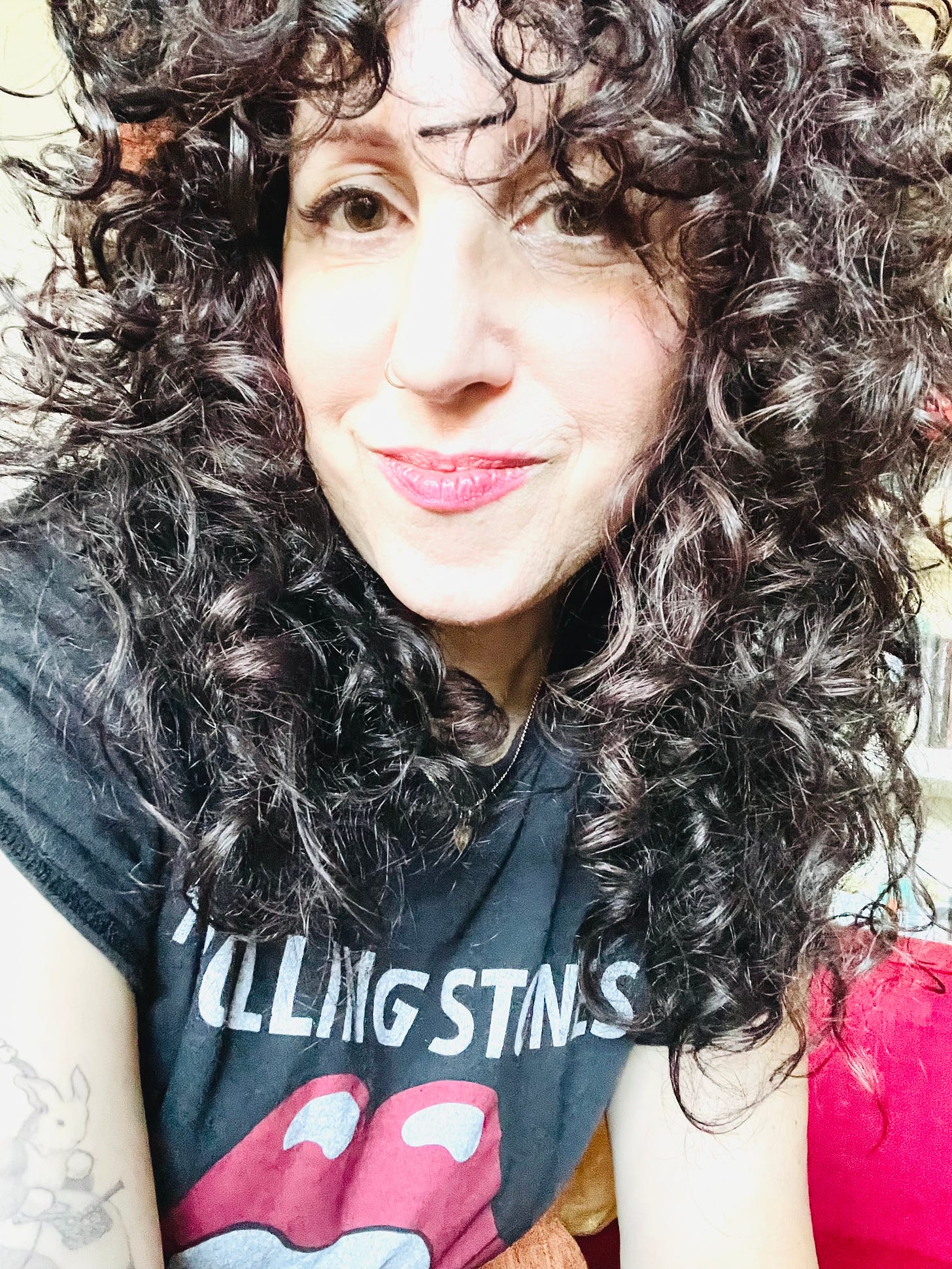Here I Am
On the day of the Tree of Life synagogue massacre, Melinda Gordon Blum, daughter of a Holocaust survivor, reflects on enduring as a form of defiance.
Editor’s Note: As a second-generation Holocaust survivor, Melinda Gordon Blum’s essay hit home for me. Like her, my family was deported from Hungary to a concentration camp, and I’ve also wrestled with mixed emotions about the responsibilities that come with that legacy. Now, with the rise in antisemitism, it’s time to say, “Here I Am.” As the nonfiction editor of Judith Magazine, I chose this piece for our inaugural edition because it captures the courage and commitment that our moment demands. — Howard Lovy
In the sanctuary of Wilshire Boulevard Temple in Los Angeles, I check for the nearest exit doors. I flip through the prayer book’s tissue-thin pages until I arrive at the page number the rabbi has announced, my eyes skimming the English transliteration of the Hebrew words. I rise reflexively and numbly from my seat for the opening of the ark that houses the Torah. I’m not religious, and in temple I often feel out of place. Today, that discomfort is off the charts. It is a vertiginous, stomach-knotting mixture of grief and incredulity followed by a bitter lack of surprise. The news is breaking, and so am I.
It is the morning of October 27, 2018, and I am attending a friend’s son’s Bar Mitzvah. I don’t want to be here, and yet I feel compelled. I’m processing the news that lit up the Notifications screen on my phone a couple of hours ago, alerting me to what just happened in a synagogue on the opposite side of the country. In Pittsburgh, Pennsylvania, a gunman walked into the sanctuary of a temple called the Tree of Life. There, in the deadliest attack on American Jews in our country’s history, he murdered eleven worshippers and wounded six more.
My father was eight in 1944 when the Nazis ordered women in Budapest under the age of forty to report for labor at a distant brick factory. His mother was thirty-nine. One evening, the Arrow Cross soldiers rounded up the neighborhood Jews and forced them to wait in a public square. My dad clung to his mother’s hand. Hours passed. At nightfall, a sympathetic police officer unlocked the doors of a nearby synagogue. He told the waiting Jews they could shelter in its sanctuary until morning. Dad followed his mother—my grandma—into the pews. He laid his head in her lap, and she stroked his hair until he fell asleep. These few hours were his last memory of her. A few days later, a packed rail car on a transport train awaited. There was no brick factory. The women were taken to the concentration camp Dachau. My grandma perished there.
In 1939, there were an estimated 400,000 Hungarian Jews. The vast majority were murdered during the Holocaust. Following the revolution of 1956, another 40,000 fled, including my father. Fewer than 50,000 Jews live in Hungary today. Of these, fewer than 11,000 identify as religious.
It wasn’t until I was about to leave for college that Dad began opening up and sharing his survivor story publicly, first in my sister’s ninth-grade honors English class when they were reading The Diary of Anne Frank and soon after to schoolchildren across Southern California. He began connecting with fellow child survivors. They became the big, extended family the war had stolen from him. He told his story to the Shoah Foundation. Dad stopped hiding. He transformed.
Though I am the daughter of a survivor, I grew up feeling insulated from antisemitism. It was an insulation of miles, an ocean, decades. Of an uneventful childhood. It was an insulation of ideas, and to a certain extent, of myths—of what was omitted as much as what was shared. Dad wanted to make the space between his experience and mine so vast it would render the past unrecognizable. Unknowable. For a long time, he remained silent.
There are few differences between me and the Tree of Life’s eleven dead Jews. It’s only that so far, a hateful, armed assailant has not crossed my path. “The lethal attacks on American Jews in recent years have been so shocking and disorienting,” Dara Horn writes, “not merely because of their sheer violent horror, but because they contradict the story American Jews have told themselves for generations, which is that America has never been a place where antisemitism affected anyone’s life. We don’t simply prefer this founding legend. We need it. The story is more important than history because the story is the device that makes meaning.” The meaning is a survival mechanism. The meaning allows trauma survivors to maintain hope for something better. The meaning is a respite from the running and the hiding.
But what happens when the assimilation story no longer holds up? Social media conspiracies about sinister Jewish power and control, along with modern-day blood libels, are proliferating. They prove that everything old can become new again. Are we safe? Will an unseen force protect us? My God is capable of powers beyond the realm of human potential, but those powers have limits. It isn’t God’s duty to rescue humans, to absolve us of our responsibilities, to prevent us from repeating cycles of hatred and fear, to stop us from making mistakes and committing atrocities. God cannot rescue humanity from the flaws inherent to the human condition. Jews, along with everyone else, will have to figure out—over and over—how, and if, it remains possible to save ourselves.
Dad found a way back to God. I regret not asking him more about that before he died (in 2012, at the age of seventy-five). I wonder if he would have shared any of my spiritual beliefs. For one thing, I don’t agree with sentiments like “there but for the grace of God go I.” It seems to me that God’s grace is not a limited resource. Grace is unconditional; it is for everyone. It is for the dead and the living. It is equally available to those inspired to righteousness and to those who succumb to evil. This means that divine grace extends, by definition, to the murderers. It’s up to them what they choose to do with it. I wonder if Dad believed that, as I do.
The Bar Mitzvah boy’s Torah portion this morning is the Akedah, or Binding of Isaac. It is one of the Old Testament’s most controversial passages. God orders Abraham to sacrifice his son, Isaac, on Mount Moriah. Abraham agrees. He cries out to God, “Hineni,” or “Here I am.” God, observing Abraham’s reaction to this extraordinary test of faith, sends an angel to stop him. Isaac is spared.
Hineni appears 178 times in the Old Testament. Like many Hebrew words, it has multiple interpretations. Hineni also means “Here I stand.” It conveys the humility of being of service, and an attentiveness and personal responsibility that might be described as “showing up.” Hineni means being fully present to another human being, saying “I’m all in.” It is a word that conveys spiritual and emotional readiness. It embodies a contradiction: hineni is both about self-sacrifice and about the act of witnessing and being witnessed. It’s about showing up for others—for God, yes—but also about showing up for ourselves. It is a statement made by people who have undergone a foundational moment of crisis or change.
In 2018, on a tragic day for American Jews, a thirteen-year-old boy stands at a podium inside a ninety-year-old sanctuary, joyously chanting the Hebrew words of a story that is thousands of years old. The daughter of a Holocaust survivor listens. How unlikely—how miraculous—that any of us are here. People have always wanted us dead. We cannot escape being hunted, even in our sanctuaries. Our continued existence, depending on whom you ask, is either an affirmation or an affront. Yet here we are. Here I am.
I don’t know how to translate the Hebrew words I am hearing. My body is an inadequate space to house the yearning resulting from my father’s absence, the guilt that I haven’t done my best to honor him with a fitting legacy, the fear I have for my Jewish children’s future. If the Holocaust had never happened, Dad might have gone on to have a peaceful, uneventful life—one in which he never felt compelled to escape his homeland to find a new one. Maybe his mother would have remarried. Maybe Dad would have had half- or stepsiblings. Maybe he’d have taken over the family business, married a lovely Hungarian woman and had children. And then my story would not exist. In other words, a horrific genocide set in motion the catastrophic events allowing me and my sons to come into being. This asks of me a seeming impossibility. As a second-generation survivor, I must find a way to accommodate two things that ought to cancel each other out: a fathomless grief and an abundant gratitude.
All I can do is refuse to hide. All I can do is keep showing up—for myself, for others, and for an unapologetic, fearless, loving Jewishness. A Jewishness with the courage to look backward and forward, and the optimism to remain grounded in today. Every morning I can wake up and recommit to tikkun olam—the repair of our broken world. Here I am. Survival itself becomes a prayer and the prayer’s answer.
Melinda Gordon Blum holds an MFA in Creative Nonfiction from UC Riverside-Palm Desert. She is the former managing editor of The Coachella Review, where she continues on as its blog editor and lead copy editor and contributes to book reviews. Her essays have appeared in the Los Angeles Times, Lunch Ticket, Kveller, The Keepthings, the Sun Magazine’s “Readers Write,” and other publications. Her viral Threads account showcasing her Jewish cultural humor and sensibility recently caught the attention of Hey Alma and Kveller (Melinda was featured in an issue of the Kveller newsletter!) who have reposted her writing and earned her many new fans. “Here After” is adapted from her memoir on intergenerational family trauma, Where Do We Start? Essays on the Legacies of Survival, for which she is currently seeking representation and publication.
Five tiny delights
A purring cat who comes to sit in my lap during my daily meditation rituals
The smell of books and bookstores—particularly used books/bookstores. The mustier, the better!
Yellow flowers—(I love sunflowers and daisies)—in a mason jar on my kitchen table
The heady, aromatic microclimate that descends over my kitchen when I’m cooking one of my father’s Hungarian recipes
The first chilly fall morning in Los Angeles (how I yearn for it now, still at the height of summer weather!)
Five tiny Jewish delights
The recitation and melody of the Avinu Malkeinu. I seldom get through it with dry eyes.
Multiple examples that fall under the category of “Jewish sweets”: Black and white cookies! Rugelach! Babka! Halvah!
The colorful “SHALOM, Y’ALL” tile I bought in Jerusalem and hung in my kitchen
Zoom and FaceTime Shabbats, which my mom, sister, and I began over the pandemic and continue.
Yiddish sayings (and especially curses!). My favorite seasoning (besides za’atar).







Melinda, I'm so glad Howard chose this. The Tree of Life was my own childhood synagogue. I had my bat mitzvah there. This essay is dear to my heart. Thank you for letting us run it.
I was in Pittsburgh that weekend, visiting my son, who was a student at Pitt. It was surreal.